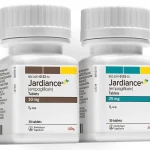Rybelsus Side Effects

A side effect is usually regarded as an undesirable secondary effect that occurs in addition to the desired therapeutic effect of a drug or medication. Side effects may vary for each individual depending on the person’s disease state, age, weight, gender, ethnicity, and general health.
Side effects can occur when commencing, decreasing/increasing dosages, or ending a drug or medication regimen. Side effects may also lead to non-compliance with prescribed treatment. When side effects of a drug or medication are severe, the dosage may be adjusted or a second medication may be prescribed. Lifestyle or dietary changes may also help to minimize side effects.
What is Rybelsus?
Rybelsus is an antidiabetic medication that contains the active drug semaglutide. It’s a glucagon-like peptide-1 (GLP-1) agonist. This drug isn’t available in a generic form. Instead, it only comes as the brand-name drug Rybelsus.
Rybelsus (semaglutide) comes as 7 mg or 14 mg tablets used along with diet and exercise to improve blood sugar (glucose) in adults with type 2 diabetes. You’ll take it by mouth once a day, at least 30 minutes before your first meal of the day.
According to the CDC, More than 37 million Americans have diabetes (about 1 in 10), and approximately 90-95% of them have type 2 diabetes. Type 2 diabetes most often develops in people over age 45, but more and more children, teens, and young adults are also developing it.
Who should not take Rybelsus?
Do not use Rybelsus if:
- you or any of your family have ever had a type of thyroid cancer called medullary thyroid carcinoma (MTC), or if you have an endocrine system condition called Multiple Endocrine Neoplasia syndrome type 2 (MEN 2).
- you have had a serious allergic reaction to semaglutide or any of the ingredients in Rybelsus.
What are the possible side effects of Rybelsus?
The most common side effects of Rybelsus may include:
- Nausea
- Stomach (abdominal) pain
- Diarrhea
- Decreased appetite
- Vomiting
- Constipation.
Nausea, vomiting, and diarrhea are most common when you first start Rybelsus.
Rybelsus may cause serious side effects, including:
• inflammation of your pancreas (pancreatitis). Stop using Rybelsus and call your healthcare provider right away if you have severe pain in your stomach area (abdomen) that will not go away, with or without vomiting. You may feel the pain from your abdomen to your back
• changes in vision. Tell your healthcare provider if you have changes in vision during treatment with Rybelsus
• low blood sugar (hypoglycemia). Your risk for getting low blood sugar may be higher if you use Rybelsus with another medicine that can cause low blood sugar, such as a sulfonylurea or insulin. Signs and symptoms of low blood sugar may include: dizziness or lightheadedness, blurred vision, anxiety, irritability or mood changes, sweating, slurred speech, hunger, confusion or drowsiness, shakiness, weakness, headache, fast heartbeat, and feeling jittery
• kidney problems (kidney failure). In people who have kidney problems, diarrhea, nausea, and vomiting may cause a loss of fluids (dehydration), which may cause kidney problems to get worse. It is important for you to drink fluids to help reduce your chance of dehydration
• serious allergic reactions. Stop using Rybelsus and get medical help right away, if you have any symptoms of a serious allergic reaction, including swelling of your face, lips, tongue, or throat; problems breathing or swallowing; severe rash or itching; fainting or feeling dizzy; or very rapid heartbeat
These are not all the possible side effects of Rybelsus. Ask your doctor about other potential side effects. Tell your doctor about any side effect that bothers you or does not go away.
Tell your doctor if you are pregnant, planning to become pregnant, or planning to breastfeed.
What to do when Rybelsus is not working for you?
Sometimes, when people say their medication isn’t working, what they mean is that they have side effects they can’t tolerate. If the problem is side effects, then you definitely need to change treatments, perhaps to a more tolerable drug.
However, switching to a new medicine won’t necessarily correct your blood sugar levels immediately. You might need to tweak the dose or try a few drugs before you gain control over your diabetes.
See your doctor about once every three months to go over your blood sugar and A1C levels. These visits will help your doctor determine if your oral medicine is controlling your blood sugar. If not, you’ll need to add another drug to your treatment or switch your medication.





